

Cosmonaut says space station bacteria 'come from outer space' A Russian cosmonaut claims to have caught aliens.
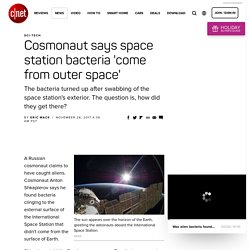
Cosmonaut Anton Shkaplerov says he found bacteria clinging to the external surface of the International Space Station that didn't come from the surface of Earth. Shkaplerov told the Russian news agency Tass that cosmonauts collected the bacteria by swabbing the outside of the space station during space walks years ago. "And now it turns out that somehow these swabs reveal bacteria that were absent during the launch of the ISS module," Shkaplerov told Tass. "That is, they have come from outer space and settled along the external surface. They are being studied so far and it seems that they pose no danger. " Settler. A modern (1850) depiction of the first medieval settlers arriving in Iceland A settler is a person who has migrated to an area and established a permanent residence there, often to colonize the area.
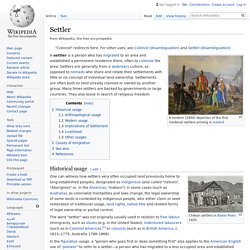
Settlers are generally from a sedentary culture, as opposed to nomads who share and rotate their settlements with little or no concept of individual land ownership. Settlements are often built on land already claimed or owned by another group. Many times settlers are backed by governments or large countries. They also leave in search of religious freedom. Historical usage[edit] One can witness how settlers very often occupied land previously home to long-established peoples, designated as indigenous (also called "natives", "Aborigines" or, in the Americas, "Indians").
In Imperial Russia, the government invited Russians or foreign nationals to settle in sparsely populated lands.[3] These settlers were called "colonists". Fermi paradox - Wikipedia. A graphical representation of the Arecibo message – Humanity's first attempt to use radio waves to actively communicate its existence to alien civilizations The Fermi paradox (or Fermi's paradox) is the apparent contradiction between high estimates of the probability of the existence of extraterrestrial civilization and humanity's lack of contact with, or evidence for, such civilizations.[1] The basic points of the argument, made by physicists Enrico Fermi and Michael H.
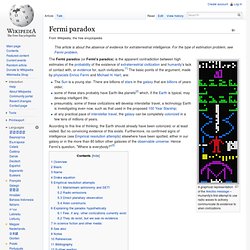
Hart, are: The Sun is a young star. There are billions of stars in the galaxy that are billions of years older;some of these stars probably have Earth-like planets[2] which, if the Earth is typical, may develop intelligent life;presumably, some of these civilizations will develop interstellar travel, a technology Earth is investigating even now, such as that used in the proposed 100 Year Starship;at any practical pace of interstellar travel, the galaxy can be completely colonized in a few tens of millions of years.
Whitley Strieber. Early life[edit] Strieber was born in San Antonio, Texas, the son of Kathleen Mary (Drought) and Karl Strieber, a lawyer.[3] He attended Central Catholic Marianist High School in San Antonio, Texas.
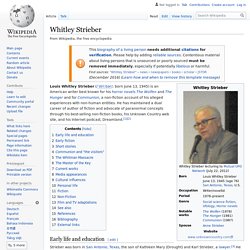
He was educated at the University of Texas at Austin and the London School of Film Technique, graduating from each in 1968. He then worked for several advertising firms in New York City, rising to the level of vice president before leaving in 1977 to pursue a writing career. Early fiction[edit] Strieber then turned to speculative fiction with social conscience. In 1986, Strieber's fantasy novel Catmagic was published with co-authorship credited to Jonathan Barry, who was billed as an aerospace industry consultant and a practicing witch.[8] In the 1987 paperback edition, Strieber states that Jonathan Barry is fictitious and that he is the sole author of Catmagic. Short stories[edit] Communion. From Wikipedia, the free encyclopedia Jump to navigationJump to search Communion may refer to: Religion[edit] Entertainment[edit] Music[edit] See also[edit] Communio, a theological journal.
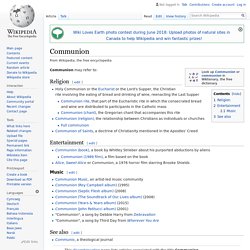
‘Aliens prevented nuclear war on Earth’: Former NASA astronaut makes unexpected claim. Aliens came to Earth to stop a nuclear war between the US and the Soviet Union at the start of the Cold War, according to the sixth man to walk the surface of the moon.
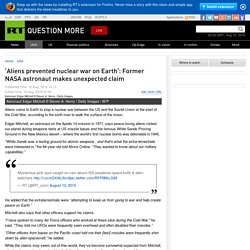
Edgar Mitchell, an astronaut on the Apollo 14 mission in 1971, says peace-loving aliens visited our planet during weapons tests at US missile bases and the famous White Sands Proving Ground in the New Mexico desert – where the world's first nuclear bomb was detonated in 1945. "White Sands was a testing ground for atomic weapons - and that's what the extra-terrestrials were interested in," the 84-year-old told Mirror Online.
“They wanted to know about our military capabilities.” He added that the extraterrestrials were “attempting to keep us from going to war and help create peace on Earth.” Mitchell also says that other officers support his claims. "I have spoken to many Air Force officers who worked at these silos during the Cold War," he said. Jacques Vallée. Jacques Fabrice Vallée (French: [vale]; born September 24, 1939) is a venture capitalist, computer scientist, author, ufologist and former astronomer currently residing in San Francisco, California.
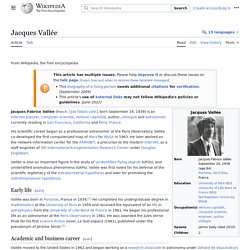
In mainstream science, Vallée is notable for co-developing the first computerized mapping of Mars for NASA and for his work at SRI International on the network information center for the ARPANET, a precursor to the modern Internet.